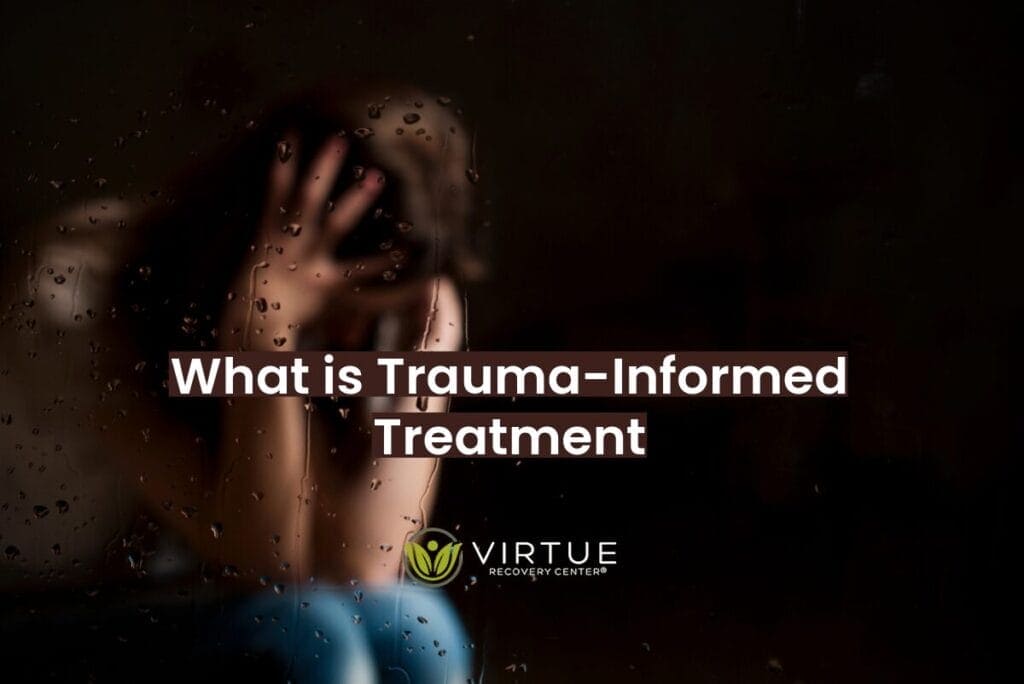Trauma is a normal, natural response you may have after seeing or experiencing a terrible and disturbing event. Trauma-informed treatment can help you or a loved one heal from trauma and learn healthy, effective coping methods.
Continue reading to learn more about trauma and post-traumatic stress disorder (PTSD) and how trauma-informed treatment can help you recover from your past experiences.
What Is Trauma?
Trauma is an emotional or psychological response to a terrible, disturbing event such as physical assault, a natural disaster, or an accident. Other common causes of trauma include injury, childhood neglect, a relationship breakup, or the death of a loved one.
It’s completely normal to experience emotions such as shock, denial, and fear for a short period following a traumatic event. However, the trauma that lingers for a long time and prevents you from moving on with your life can negatively affect your well-being and increase your risk for chronic conditions, including mental illness and substance use disorders. Trauma that persists and never goes away usually requires professional treatment with a therapist or another trauma expert.
Many of us are bound to experience trauma at some point in our lives. According to the Department of Veterans Affairs (VA), 60% of men and 50% of women experience at least one trauma during their lifetime.
What Is PTSD?
PTSD is a psychiatric disorder and the result of severe or worsening trauma. People with PTSD have difficulty recovering and moving on with their lives after witnessing or experiencing a terrifying or disturbing event. An estimated 7% to 8% of the U.S. population will have PTSD at some point in their lives, and an estimated eight million adults have PTSD during any given year.
PTSD symptoms fall into four categories: intrusion, avoidance, changes in mood and cognition, and changes in arousal and reactivity. Symptoms of PTSD tend to vary in severity from one person to the next and include:
- Flashbacks of the traumatic event
- Nightmares
- Repeated memories of the event
- Avoiding people, places, and situations that serve as reminders of the event
- Avoiding remembering or talking about the event
- Inability to remember key aspects of the traumatic event
- Loss of interest in long-held hobbies and favorite activities
- Inability to experience pleasure
- Negative thoughts and feelings that eventually lead to distorted beliefs
- Ongoing anger, guilt, shame, fear, and horror
- Isolation and detachment from others
- Demonstrating self-destructive behaviors
- Paranoia
- Poor concentration
- Difficulty sleeping
- Irritability
- Angry outbursts
- Being easily startled
You may be more likely to experience PTSD after a traumatic event if you lack a strong support system of friends and relatives, have another mental illness such as depression, or have existing problems with substance misuse.
What Is the Connection Between Trauma and Addiction?
Trauma and PTSD can be extremely difficult to cope with and manage without professional treatment. Those who continue suffering from trauma and PTSD without getting help may use drugs and alcohol to “self-medicate” or reduce their symptoms. According to a 2016 study published in Current Psychiatry Reports, PTSD typically emerges before substance use disorders and increases the risk for addiction.
For example, if you have difficulty sleeping, you may try using alcohol or sedatives to avoid waking during the night. If you have problems with concentration, you may try using illicit or prescription stimulants like cocaine or ADHD medications to stay alert and improve your concentration. If you spend lots of time by yourself in isolation, you may use one or a combination of substances to numb your feelings or to prevent boredom.
The VA reports that 46.4% of people with lifetime PTSD also have substance use disorders. These individuals are at higher risk for other psychiatric problems, including depression, anxiety, social impairment, suicide, and increased mortality. Trauma-informed treatment can help people with co-occurring PTSD and addiction address and recover from the root causes of their substance use disorder.
What Is Trauma-Informed Treatment, and How Does It Work?
Trauma-informed treatment helps you acknowledge traumatic events and experiences, recognize symptoms of PTSD, and understand how traumatic events have affected your life. This treatment approach often uses various therapies that we tailor to you based on your unique situation. The primary goal of trauma-informed treatment is to determine the severity of your trauma and work with you to identify your triggers and develop a plan that helps you cope.
Trauma-informed treatment may include the following services:
- Cognitive-behavioral therapy (CBT) helps you identify and change harmful beliefs, attitudes, and behaviors related to the traumatic experience.
- Eye Movement Desensitization and Reprocessing (EMDR) combines elements of CBT with eye movements and other forms of left-right stimulation to help you move on from the traumatic event and improve your mental health.
- Experiential therapy, in which you use role-playing, music, art, and other expressive tools to re-enact the traumatic event and explore and release negative emotions associated with the event.
- Prolonged exposure therapy is a type of CBT that helps you face and confront memories, emotions, and situations related to the traumatic experience and reduce your PTSD symptoms.
- Somatic experiencing is an alternative treatment approach that focuses on using the mind-body connection to help you release pent-up physical energy through crying, shaking, yelling, etc.
- Psychodrama therapy helps you explore emotional trauma and learn healthier coping methods related to stress management, communication, and social situations.
- Medications such as antidepressants and prazosin — the latter of which is a high blood pressure medication that may be used to treat PTSD-related sleep problems.
- Support group therapy allows you to bond with others recovering from trauma and share unique trauma-related experiences.
Trauma-informed treatment can help anyone struggling with trauma, mental health, and/or a substance use disorder. If you are trying to recover from a traumatic event and are also experiencing problems with a mental illness or addiction, we will tailor your treatment program to help you recover from your co-occurring disorders.
Where to Find Trauma-Informed Treatment
Many drug and alcohol rehab centers offer trauma-informed treatment to help those who started using substances with hopes of self-medicating symptoms of trauma or PTSD.
At Virtue Recovery Center, our goal is to help you experience a long-lasting recovery from trauma, PTSD, and addiction through a combination of medical detox, dual diagnosis therapy, and behavioral therapies in one of our many customizable rehab programs. Contact us today at (866) 219-9961 to learn more about our available services or fill out our insurance verification form to learn more about your benefits and coverage for trauma-informed treatment.



























